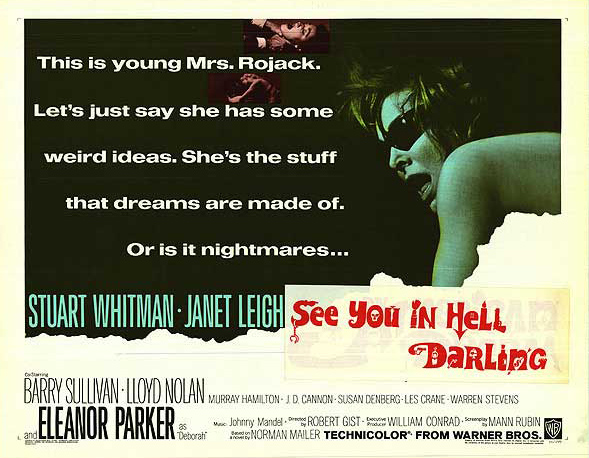
AN AMERICAN DREAM (SEE YOU IN HELL, DARLING))
US, 1966, 103 minutes, Colour.
Stuart Whitman, Janet Leigh, Eleanor Parker, Barry Sullivan, Lloyd Nolan, Murray Hamilton, J.D. Cannon, Warren Stevens, Paul Mantee, Harold Gould.
Directed by Robert Gist.
An American Dream is based on a celebrated novel by Norman Mailer. Mailer still has a strong reputation for tough American writing. His novel about World War Two, The Naked and the Dead, was filmed in 1958. Another of his books, Tough Guys Don’t Dance, was filmed in the 1970s. He also wrote the story of criminal Gary Gilmore, The Executioner’s Song, made for television by Lawrence Schiller, starring Tommy Lee Jones.
The American Dream is the phrase that covers the ambitions for any American to be whatever they desire to be, including president. This film is rather cynical in its presentation of the American Dream and its becoming an American nightmare. The film focuses on the world of television, embodied in the leading man, played by Stuart Whitman. It is also the world of rich neurotic women, played to the hilt by Eleanor Parker. Janet Leigh provides something of a balance.
The cast is strong. However, most of them had moved on from their glamorous star days. Eleanor Parker made a career of chewing up the scenery in highly emotive performances like The Man with the Golden Arm as well as being the baroness in The Sound of Music. With Tuesday Weld in the television version of Madame X, she shows how capable she was of this kind of domineering vicious role. Janet Leigh, on the other hand, generally was sweetness and light.
The film was directed by Robert Gist, a television director who made very few feature films.
1. The significance of the title? its explanation during the film? Norman Mailer and his interests and reputation? Popular acceptance of the term ‘American dream’, its relationship to ambition, money, achievement, morality?
2. How satisfying a film version of a prominent novel? The quality of the plot, dialogue, the strong verbal orientation and communication?
3. To what genre did the film belong? Comment on its style, a film of the mid 60s: the use of colour, the atmosphere and environment of the big city, the buildings, wealth, gangsters, the world of communications? Symbols of modern America? Influencing the people who live and work within this environment?
4. The opening with the communication between Stephen and Deborah? The world of the rich neurotic woman and the world of the ambitious television man? The means of communication telephone and television? The contrast of the two worlds and the communication by images? What did this reveal about the two of them as characters? Their relationship? The two worlds of society and private worlds?
5. How important a man was Stephen in himself? His strengths as a man, his weaknesses? His television work, his involvement in it, personal integrity in his work? His reaction towards the police? His crusading and seeking out of corruption? His marriage to Deborah? Why? His relationship with Cherie and the significance of the past? His relationship with Ruth? His status, the world of wealth, guilt? The importance of American guilt and guilt as a neurosis?
6. How was Stephen meant to be the average American male: his background, climbing, sexuality and violence, guilt, death?
7. The portrayal of Deborah? Her background, wealth, status in society. Catholic? The reasons for her neuroses, her anger and violence? Her love and hatred for Stephen? Power? The bitchy games that she played? Her clawing, contriving situations? Her death - as caused by Stephen, as willed by him, as caused or willed by herself?
8. The importance of the background of police and police work, anger, criticism, the police and the violence of their interrogations, inner corruption?
9. The portrayal of Ganucci, the accident with the car, the irony of his being present at Deborah's death? The police and their enquiries? Anger leading to murder? Expiation?
10. Cherie's introduction to the plot: her presence at the time of the death, with Ganucci, the link with Stephen? The revelation about their past, her needing help, her wanting to help Stephen? The qualities of her personality, her weaknesses? The significance of the tree house and what it symbolised of her and for her? Her sheltering of Stephen, the possibility of love? The pressures put on her for betrayal? The evil in her betrayal? The condemnation that she was a whore at heart?
11. The irony and criticism about the television world, the evil within the world of networks, TV contracts, sensationalising and exploiting people? Stephen and personal situations, embroi1ed in big business?
12. The personality of Kelly, as a rich man, the irony of his Catholic background and his pressure on the bishop for a Catholic funeral, his attitude towards suicide? His wealth, arrogance, dislike of Stephen? The importance of the confrontation? The content of his lecture to Stephen and the indication of themes? The menacing of Stephen about death and falling? Strength of will, cowardice?
13. Did Stephan have any other option than to confront death? That his life was burnt out, that his despair was almost suicidal?
14. The film was melodramatic. How well does melodrama portray the inner tensions and violence of the American way of life, the American ethos, the American dream?